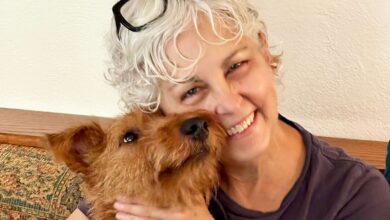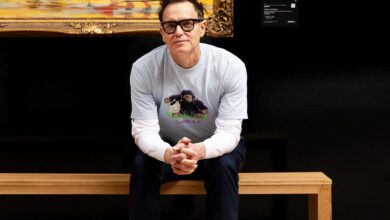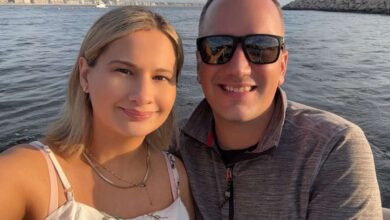Leland Vittert Describes Growing Up with Autism in ‘Born Lucky’
:max_bytes(150000):strip_icc():format(jpeg)/Leland-Vittert-born-lucky-092925-1-8d62cab22b454b5f9663ab45bdb5b5b2.jpg)
NEED TO KNOW
- NewsNation anchor Leland Vittert opens up about his childhood in a new memoir
- In Born Lucky: A Dedicated Father, A Grateful Son, and My Journey with Autism, he credits his father with helping him become the man he is today
- Born Lucky is on sale now, wherever books are sold
When Leland Vittert was born, his umbilical cord had wrapped around his neck and knotted twice. Had his mother not delivered him via cesarean section, he could have died, prompting the doctor to nickname him Lucky. It would mark the only time his parents would allow a doctor to label him.
In his new book, Born Lucky: A Dedicated Father, A Grateful Son, and My Journey with Autism (out Sept. 30) Leland, 43, recounts showing signs of what we now recognize as autism from a young age and his father’s role in helping him thrive. Leland didn’t speak until he was 3, found eye contact “impossible” and “struggled tremendously with social cues.” But since then, he’s made a career out of communication: The former Fox News correspondent works as an anchor at the cable network NewsNation, where he also hosts On Balance With Leland Vittert.
In Born Lucky, Leland describes being bullied mercilessly in middle and high school by both students and staff, including a principal who once told his parents, Mark and Carol, “the people here think Lucky is really pretty weird,” and “I guess I do too.” Leland, routinely humiliated by his teachers and classmates, says he often cried himself to sleep.
Harper Horizon
“As a little kid, I didn’t have any kid friends because I was so repellent to kids,” Leland says. “So talking to my dad about politics became my only outlet.” In the book, he writes that for many years, his father would be his only friend.
Leland, a St. Louis native, says what makes his story unique is that his parents never told him about his diagnosis until college, and they never told anyone else either.
Mark Vittert, a former newspaper publisher, refused to allow doctors to diagnose his son and instead worked out his own methods to help him adapt to the world. That included demanding he do 200 push-ups a day at age 8 to prepare him to ward off bullies or through a signal he called the “watch tap” — if his dad tapped his watch, Leland would know he had been talking too long or interrupted someone without realizing it. Then they’d talk through it later. “It was almost like a coach and a player. We would watch game film,” Leland says. “We would go back through social interactions.”
After Leland took an IQ test in the fourth grade, evaluators told him and his parents that a learning disability was usually represented by a 20-point spread between the two halves of the test. Leland says his spread was 68 points — which the evaluator said they had never seen before. At the time, he had difficulties writing a sentence and spelling — the latter of which he says still poses a challenge.
Meanwhile, math and science came easily for him. His parents sought a second opinion from a clinical psychologist who told them she had never seen such a disparity, either. When Leland’s father asked the psychologist whether there was anything they could do, she told him, “Generally not.” But there were circumstances that could allow the highly intelligent Leland to have a better life. Leland had to want to improve and to be part of society. Those five words: Lucky has to want it, Leland writes, guided his father through his adulthood.
Courtesy Leland Vittert
In a separate interview with PEOPLE, Mark Vittert says that he later had another expert evaluate Leland when he was a bit older. “He said to me, ‘You guys are doing the right things at home, whatever they are,'” Mark recalls. “He said he has a very good chance of being able to operate in the conventional world.”
Mark, who stressed his gratitude for Leland’s appreciation, says he did what any loving father would.
“We tried our best at that time,” he says. “We weren’t in the least reading books about this or that. It was just trying to deal with him. We just kept at it. I don’t think we changed the way we acted from the very beginning till now.”
Never miss a story — sign up for PEOPLE’s free daily newsletter to stay up-to-date on the best of what PEOPLE has to offer, from celebrity news to compelling human interest stories.
He also credits his wife Carol, whom he describes as “an angel” who worked hand-in-hand with him and their daughter, Liberty. “There’s not one chance there could have been a decent outcome without Carol,” he says.
Mark says he wrote down four principles for himself on a piece of paper when Leland was first diagnosed and carried them with him for many years. The first was to have no expectations about the future. The second was to never allow your child to feel that they have ever disappointed you.
“Number three is that you are the depository of their hurt, their frustration and their humiliations,” he says. “You must listen and listen,” in the morning before school and late into the night. “And lastly,” Mark says, “Tell them that they have the right stuff for life, that the currency of high school is not the currency of life. There are many more years after the six years of high school and junior high.”
The PEOPLE Puzzler crossword is here! How quickly can you solve it? Play now!
Mark’s journalism background led him to worry for Leland when his son decided to pursue a career in that field as well. “I thought he’d have terrible, terrible, terrible troubles,” he says. “I thought he would not be able to survive the smallest newsroom.”
Leland did face hardships along the way, but also found much success. He worked as a Middle East correspondent at Fox News for nearly four years, which found him covering the Egyptian protests in the Arab Spring of 2011 and reporting from Libya. It was through international reporting that he gained a real sense of responsibility and confidence he hadn’t had before. In the Middle East, he writes, he proved that he could get the story under extreme pressure while keeping himself and his team safe.
Today, the author wants the book to offer hope for parents of kids experiencing similar struggles. “Adversity is your friend,” Leland says. “Adversity as a kid is a good thing.”
Born Lucky is available now, wherever books are sold.
Credit to Nypost AND Peoples



